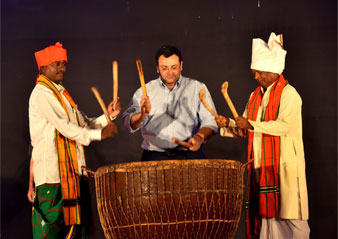Samvaad 2015 witnesses exchange of ideas at Day-3
- Tata Group Chairman addresses 1,500 tribal delegates at 'Samvaad - A Tribal Conclave'
- Day-3 witnesses panel discussions and cultural performances from across India
- Paper Presentations on 'Tribal Identity' by research scholars and academicians
 The third day of Samvaad - A Tribal Conclave, being organised by Tata Steel, for the second consecutive year at Gopal Maidan, marked panel discussions, cultural performances and handicrafts exhibition.
The third day of Samvaad - A Tribal Conclave, being organised by Tata Steel, for the second consecutive year at Gopal Maidan, marked panel discussions, cultural performances and handicrafts exhibition.
Speaking at the Samvaad 2015 conclave, Mr. Cyrus Mistry, Chairman, Tata Group said, "I am indeed very happy to be here at Samvaad which brings together more than 1500 people from 35 tribes across 20 states of our country on a single platform to celebrate their unique identity and culture and discuss issues that confront them. It is with great pride that I spend this evening with you and I hope you enjoy the coming days. I wish the Samvaad conclave all the success."
The day began with panel discussions at 'Chintan' with eminent academicians brainstorming on the topic 'The Resurgent Tribal Literature'. Moderating the first session Professor Esther Syiem, North Eastern Hill University, Shillong said, "Tribal literature is making itself felt in the literary circuit. Tribals have a lot to offer to the rest of the country in terms of literature." Talking on the state of tribal languages across the country, Dr Ivy Hansdak, Jamia Milia University, New Delhi, said, "In tribal communities there is a class of people that pose threat to the tribal languages. This class primarily comprises educated tribes that dissociate themselves from their indigenous languages after reaching prominent positions." Taking the discussion further Dr Lisa Lomdak, Rajiv Gandhi University, Arunachal Pradesh, said, "Words from mainstream languages have streamed in to tribal languages. This has complicated the work of linguistics, as they fail to record tribal languages in their purest forms."
The second session was moderated by Dr Bhagwandas Patel, Hony. Director Adivasi Academy, Tejgarh, Gujarat. In his address Dr Patel said "Tribal literature that is centered around nature has its own distinct identity. Those involved in the translation of tribal folktales and narratives first need to understand the sentiments of tribes in order to project their lifestyle in a better way." Participating in the panel discussions, Editor Dhol Magazine, Dr Vikram Choudhary said "What universities can't teach, can be learnt in the company of tribes. Tribes have a lot to offer in literature too." Addressing the delegates, Dr Vira Rathore, Member of Language Advisory Committee, Maharashtra, said ''As many as 47 tribes in Maharashtra are contributing to the tribal literature in one form or the other."
During the plenary session on the topic 'Has India failed its tribal communities?' Padma Shri recipients Ms. Shantha Sinha and Ms Tulasi Munda called upon the tribes to explore every opportunity to get educated. Padma Shri Jadav Payeng asked the tribes to get united to protect nature. Dr. Balasubramaniam, Founder and Chairman of The Swami Vivekanand Youth Movement, Mysore underlined that mindless development at the cost of nature should be shunned.
A series of scholarly papers on Tribal Identity theme was presented at the Centre For Excellence. Sudhir Kumar and Pragya Shukla from Guru Ghasidas Vishwavidyalaya, Chhattisgarh presented a paper on 'Nature and Tribals: Eco-critical Aspects'. Faguna Barmahalia, research fellow from Delhi University presented a paper on 'Folklore and Ethnicity - A Study' among the Rabhas of Assam. Dr. K Nipuni Lirina from North Eastern Hill University, Shillong presented a paper on 'Nagas Worldview of Heritage'.
Reangs from Tripura mesmerized the audience with Hojagiri dance while Sumi Nagas from Nagaland presented Aphilo Kuwa: A Victory Dance. Cultural performances from Jharkhand, Sikkim, Karnataka and Odisha also regaled the spectators.
The tribal conclave is witnessing a convergence of more than 1,500 tribal artists, thought leaders, eminent personalities and activists from more than 40 different tribes, from across 25 states in the country - Andaman & Nicobar, Andhra Pradesh, Arunachal Pradesh, Assam, Chhattisgarh, Gujarat, Jammu & Kashmir, Jharkhand, Karnataka, Kerala, Madhya Pradesh, Maharashtra, Manipur, Meghalaya, Mizoram, Nagaland, Odisha, Tamil Nadu and Tripura.









